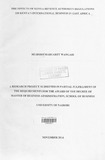| dc.description.abstract | This study was carried out with the aim of identifying the place, if any, of national
institutions within international trade. It sought to do so within the East African
Community, specifically Kenya's international business with her EAC counterparts. The
Kenya Revenue Authority was chosen as it has more interactions with the EAC members,
especially at the borders. In the first chapter, the study explores the background of the
study with emphasis on the concept of international business as well as the concept of
regional integration. Attention is accorded to the East African Community, especially the
integration process of the EAC as well as the customs union. The customs union is given
special attention because in Kenya, the responsibility of customs roles and procedures fall
under the KRA docket. As such, there is also an introduction to the Kenya Revenue
Authority within this first chapter, giving a detailed description of this major national
institution. Chapter two focuses on the literature aspect related to the study. It delves into
the theoretical foundation of the study, presenting different views espoused on regional
integration. It is here that there is an exploration of the nature of regional blocs, outlining
the process of regional integration. The practice of regional integration is also outlined
with emphasis on what characterizes a successful integration process. It is here that the
characteristics of regional blocs are outlined. Chapter three is on the methodology used in
the study. A qualitative case study approach was employed as the study was focused on
one organization. Respondents were drawn from officers stationed at seven border points,
which were deemed to be major entry and exit points into the EAC countries. Chapter
four is about data analysis, results and discussions. The results were analysed and are
presented in tables and figures. It is here that the effects of KRA's regulations on cross
border trade within the EAC are discussed. In chapter five is a discussion or the summary
of the findings, as well as the conclusions and recommendations. The study results
showed that KRA has a role to play in Kenya's international business within the EAC,
especially in the area of clearance of goods and border security. It revealed that KRA's
policies and regulations have a positive effect on how smooth business flows across the
borders, and that a lapse in implementation of some of the institution's policies results in
a negative effect on business across the EAC. | |



